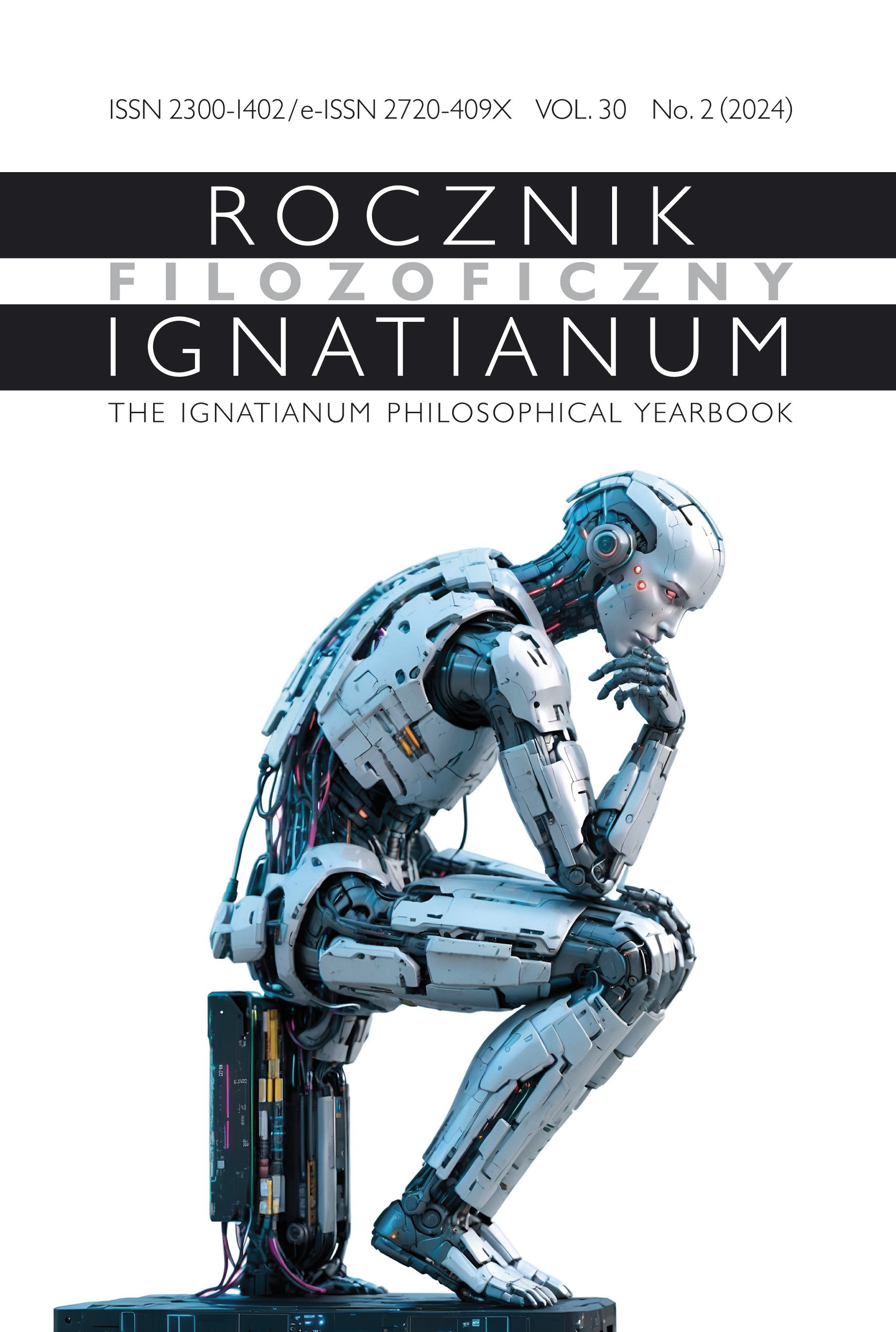Desire for the Absent. The Dynamics of Love and Desire in the Thought of Beatrice of Nazareth and Richard of St. Victor
Abstract
The article focuses on three aspects of the mystical experience: first, I want to show that some medieval authors – Richard of St. Victor, Beatrice of Nazareth and others – shifted their focus from the satisfaction of the desire for God to the analysis of desire as such. Secondly, they allowed for the possibility that spiritual experience could manifest itself in the body and could be experienced sensually and corporeally. And thirdly, they noticed that the desire for love was often accompanied by suffering and pain. The absence of an object, unsatisfied desire, corporeality and elements of suffering are interconnected in such a way that they all constitute aspects of affective experience. All three constitute the aspects of a mystical experience: desire is associated with the absence of an object, the bodily experience of desire often takes the form of physical pain and suffering.
The characteristics of the three aspects – the absence of the object of desire, the role of corporeality and the presence of suffering in love desire – will be presented in the next three parts of this article.
References
Arblaster John, Faesen Rob (red.), Mystical Anthropology. Authors from the Low Countries (New York: Routledge, 2017).
Astel Ann W., The Song of songs in the Middle Ages (London: Cornell University Press, 1990).
Augustyn, De doctrina christiana. O nauce chrześcijańskiej, tekst polsko-łaciński przełożył, wstępem i komentarzem opatrzył J. Sulowski (Warszawa: Instytut Wydawniczy PAX, 1989).
Augustyn, Wyznania, tłum. Z. Kubiak (Warszawa: Instytut Wydawniczy Pax, 1992).
Bonaventura, Legenda Maior, w: S. Bonaventurae opera omnia, vol. 10: Legendae s. Francisci Assisiensis saeculis XIII et XIV conscriptae (Florentia: Quaracchi, 1941).
Casey Michael, Athirst for God: spiritual desire in Bernard of Clairvaux’s Sermons on the Song of songs (Kalamazoo: Cictercian Publications, 1988).
Chmielewski Marek (red.), Leksykon duchowości katolickiej (Lublin–Kraków: Wydawnictwo „M”, 2002).
Coakley Sarah, Stang Charles M. (red.), Re-thinking Dionysius the Areopagite (Hoboken: Wiley-Blackwell, 2009).
Davis Robert Glenn, The Weight of Love. Affect, Ecstasy, and Union in the Theology of Bonaventure (New York: Fordham University Press, 2017).
Hendrix Guido, Hugo de Sancto Caro’s traktaat De doctrina cordis (Leuven: Bibliotheek van de Faculteit Godgeleerdheid, 1995).
Hollywood Amy, Acute Melancholia and Other Essays. Mysticism, History and the Study of Religion (New York: Columbia University Press, 2016).
Hollywood Amy, Sensible Ecstasy: Mysticism, Sexual Difference, and the Demands of History (Chicago: University of Chicago Press, 2002).
Huls Jos (red.), The Minne-Journey: Beatrice of Nazareth’s “Seven Ways of Minne.” Mystical Process and Mystagogical Implications (Leuven: Peeters, 2013).
Kitanov Severinus V., Beatific Enjoyment in Medieval Scholastic Debates. The Complex Legacy of Saint Augustine and Peter Lombard (New York: Lexington Books, 2018).
Kroll Jerome, Bacrach Bernard, The Mystic Mind. The Psychology of Medieval Mystics and Ascetics (New York–London: Routledge, 2005).
Nelstrop Louise, Podmore Simon D. (red.), Exploring Lost Dimensions in Christian Mysticism: Opening to the Mystical (London: Routledge, 1967).
Petroff Elizabeth, Body and Soul: Essays on Medieval Women and Mysticism (New York: Oxford University Press, 1994).
Płotka Magdalena, Tomasz z Akwinu o przyjemności (Warszawa: Wydawnictwo UKSW, 2021).
Richard of St. Victor, Les quatre degrés de la violente charité, red. Gervais Dumeige (Paris: Librairie philosophique J. Vrin, 1955).
Stevens Travis A., Violent Lovesickness: Richard of St Victor, Beatrice of Nazareth, Hadewijch, and Angela of Foligno (Massachusetts: Harvard University Cambridge, 2017).
Wilhelm von Saint Thierry, „Expositio super Cantica Canticorum”, w: Paul Verdeyen (red.), Guillelmi a Sancto Theodorico Opera Omnia, Pars II (Turnhout: Brepols, 1997).
Faesen Rob, „Embraced in the Fathomless Love”, Medieval Mystical Theology 23 (1) (2014): 10–19.
McGinn Bernard, „Ecstasy in Classic Christian Mysticism”, Lo Sguardo – rivista di filosofia 33 (2) (2021): 187–213.
Miller Julie B., “Eroticized Violence in Medieval Women’s Mystical Literature: A Call for a Feminist”, Journal of Feminist Studies in Religion 15 (2) (1999): 25–49.
Nelstrop Louise, „Introduction: Searching for Soul Rebels: Christian Mysticism and Pleasure after Augustine”, Medieval Mystical Theology 23 (1) (2014): 3–9. Płotka Magdalena, „Afektywna droga do Boga w ujęciu Bonawentury”, Rocznik Tomistyczny 12 (2023) 1: 127–138.
Talos Maurius, „How can love be violent? Reflections on Richard of St. Victor’s On the four degrees of violent love”, Agathos: An International Review of the Humanities and Social Sciences (2012): 61–69.
De quatuor gradibus violentae caritatis, introd. and trans. Andrew B. Kraebel, w: H. Feisse OSB (red.), On Love. A Selection of Works of Hugh, Adam, Achard, Richard and Godfrey of St. Victor (Turnhout: Brepols, 2011), 263–298. Richard of St. Victor, On the four degrees of violent love, w: Hugh Feiss OSB (red.), On Love: A Selection of Works of Hugh, Adam, Achard, Richard, and Godfrey of St. Victor (Brepols 2011), 275–296.
Copyright (c) 2024 University Ignatianum in Cracow

This work is licensed under a Creative Commons Attribution 4.0 International License.
The Yearbook only accepts materials for publication that are free of all conflicts of interest, and that in no way involve conflicts over authorship, copyright, etc. The Editors will take action against any cases of plagiarizing, ghostwriting1, guest/honorary authorship2, etc. Where co-authored work is concerned, the Author listed first is expected to take responsibility for the submission, and is required to make clear the contributions of all of the Co-Authors involved. In the event of the publication owing its existence to funding dedicated to this purpose, this fact should be made clear: e.g. in any note of thanks/acknowledgement, or in a footnote, etc. Explicit notification should be given of any form of reprinting, with the appropriate evidence of permission to publish being furnished as required. Any impropriety on the part of Authors/Reviewers risks exposing them to appropriate responses from the relevant institutions.
______
1 This term refers to instances of a person who has made an essential contribution being omitted from the list of authors, or from notes conveying gratitude and/or acknowledgement.
2 This occurs when a person who has made either an insignificant contribution or no contribution at all nevertheless appears on the list of authors.





